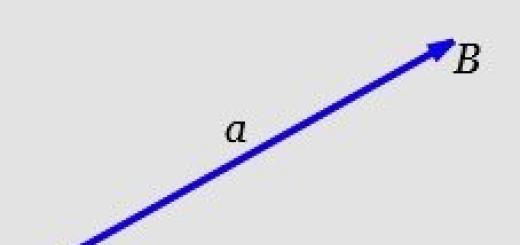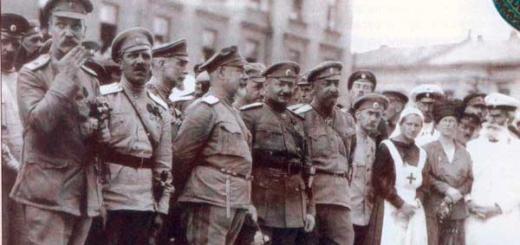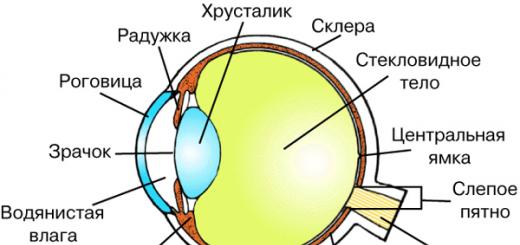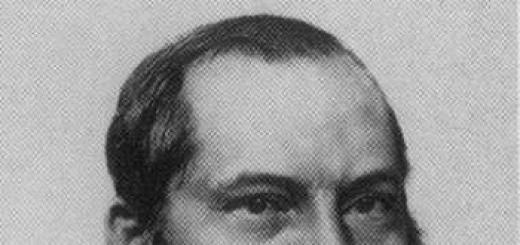Participle is an impersonal form of a verb, combining the properties of a verb, adjective and adverb. Participle in English corresponds to participle and gerund in Russian.
There are three types of participles in English: present participle, past participle And perfect participle.
Present participle in English
The present participle is formed by adding the ending -ing to the base form of the verb (i.e. Form I), so this participle is also known as "-ing" form. This form is used:
In a long (continuous) tense, for example: I am speaking- I I'm talking;
As an adjective, for example: the film is interesting- movie interesting;
As a gerund, for example: he is afraid of flying- he is afraid fly.
Please note the changes in the letter when creating this form:
| Change | Example |
| If the word ends with one " e", then it is omitted, but if the word ends in a double “ e" (that is -ee), then it does not go down. | com e– com ing But: agr ee-agr eeing |
| If a word ends with a consonant preceded by a short stressed vowel, the consonant is doubled. | si t-si tt ing |
| If the word ends with " l", preceded by a vowel, then " l" is always doubled (note that American English does not follow this rule). | travel l– travel ll ing ( BrE) travel l– travel l ing ( AmE) |
| If the word ends in "ie", That " ie"is replaced by" y". | l ie- l y ing |
The present participle can be used to describe the following verbs: come, go, sit, in this case it is placed immediately after these verbs, for example:
The girl sat crying on the sofa.
The girl sat on the sofa and cried.
The present participle can also be used after verbs of perception (, etc.), if there is no need to emphasize that the action was completed, but if it is necessary to show that the action was completed completely, the infinitive is used.
For example:
I saw him leaving.
I saw him leaving. ( That is, part of the process, not completely.)
I saw him leave.
I saw that he left. ( The action was completely completed.)
In addition, the present participle denotes an action simultaneous with the action of the verb and is used to shorten or combine sentences into active voice with the same subject, for example:
She left the house and whistled. = She left the house whistling.
She left the house whistling.
Past participle in English
The past participle is formed by adding the ending -ed to the base form of the verb (Form I), if it is a regular verb. For irregular verbs, see the third column in the list of irregular verbs.
This form is used:
In the completed (perfect) tense, for example: I have spoken- I talked;
In the passive voice, for example: the letter was written- there was a letter written;
As an adjective, for example: I was bored to death - I felt terrible boring.
Please note the change in the letter when creating this form:
The past participle is also used to shorten or combine sentences in the passive voice with the same subject, for example:
The boy was given an apple. He stopped crying. = Given an apple, the boy stopped crying.
The boy was given an apple and he stopped crying.
Perfect participle in English
The perfect participle can be used for active and passive voice.
The perfect active participle is formed as follows:
having + past participle
For example:
Having cooked, he set the table.
Having finished cooking, he set the table.
The perfect participle of the passive voice is formed as follows:
having been + past participle
For example:
Having been cooked, the food looked delicious.
When the food was cooked it looked very tasty.
The perfect participle can be used to shorten or join sentences with the same subject if:
One action (the action where the perfect participle is used) ends before the next action occurs, for example:
She bought a bike and cycled home. = Having bought a bike, she cycled home.
Having bought a bicycle, she rode it home.
One action has already been going on for some period of time when another action begins, for example:
He had been living there for such a long time that he didn't want to move to another town. = Having lived there for such a long time, he didn't want to move to another town.
Having lived there for so long, he did not want to move to another city.
Use of participial phrases in English
If some part of a sentence is shortened using a participle, then this construction is called participial phrase, For example:
Watching TV, she forgot everything around her.
She forgot about everything while watching TV. ( In this sentence watching TV- participial.)
In English, participial phrases are used mainly in writing to introduce more information in one sentence.
When using participial phrases, keep in mind the following rules:
In a sentence, the participial phrase and the subordinate clauses related to it must have the same subject.
The participial phrase contains the less important part of the sentence. Important information should be contained in the main sentence.
Always make sure the correct participle is used.
Unions like as, because, since and relative pronouns such as who And which, are lowered.
Unions before And when are not omitted and are always used in the participial phrase.
Unions after And while may be used or omitted.
Using participial phrases with different subjects
Sometimes participial phrases can be used even if the combined sentences have different subjects. This happens if, for example, the main clause contains one of the following verbs in combination with an object: feel, find, hear, listen to, notice, see, smell, watch.
For example:
I heard him playing the guitar.
I heard him playing the guitar. ( Here the participial phrase must immediately follow the complement to which it refers.)
Also, a participial phrase can be used if both subjects are mentioned (in such cases, a conjunction is often placed in front of the subject in the participial phrase with). However, this is a very formal form and is used very rarely.
For example:
Mrs. Jones went to New York. Mr. Smith took up her position. = (With) Mrs. Jones going to New York, Mr. Smith took up her position.
Since Mrs. Jones went to New York, Mr. Smith took over her position.
“Broken window”, “missed call”, “events described in this book” - we often hear, see and use such phrases ourselves. But how do you say them in English? And what is hidden under the frightening term “communion”? Let's find out!
What are participles?

First, let's look at what participles are in Russian.
Sometimes words denoting an action can be used to form a sign.
With this we can say:
1. That an action was performed on the object (the book was read - the result was a read book).
2. An object performs an action right now: a falling branch, a running person (from run), music playing (from play).
There are also participles. It's even simpler: they show someone performing one action at the same time as another. In Russian it is easy to recognize these words by -i/-th at the end:
Ved I car, don't talk on the phone.
Cheat and I book, I sometimes make notes.
Remember and I about this, he sighed.
Sometimes they show that an action was completed before another began. We distinguish them by -V at the end. For example:
Talk V on the phone, he got behind the wheel.
Read V book, don't forget to return it to the library.
Remember V about this, he sighed.
Why do we need to understand how it works? The fact is that in English all the things described can be expressed by participles! Let's deal with them in order.
1. English present participle (-ing)
Sometimes we need to show that an object is performing an action right now ( falling branch, playing music).
In English this is achieved by adding -ing to the action word: falling ( falling) branch (from fall), playing ( playing) music (from play), running ( running) person (from run).
More examples:
I woke up to the sound of a working lawn mower.
I woke up from the sound working lawnmowers.
This cigarette- smoking man is your new boss.
This person, smoking cigarette - your new boss.
The above cases are, in general, similar to Russian ones, aren’t they?
However, there are also those that are translated into Russian not using words in -ush/-yush/-ash/-yash (falling, playing, smoking), but by other means.
1. Two simultaneous actions
Remember we talked about words showing an action performed simultaneously with another? These are gerunds: talking, reading, remembering, etc.
So, in English, simultaneous actions are also expressed using -ing:
Don't drive a car while talking on the phone.
While driving, do not talk on the phone.
Reading a book I sometimes make notes.
While reading a book, I sometimes make notes.
He sighed, remembering this.
Remembering this, he sighed.
Please note that both actions are performed by the same person!
2. Explanation of the reason
Often -ing is used to explain the reason for an action or behavior. Please note that both the action and the reason refer to the same actor!
Realizing that I may be late, I decided to take a taxi.
Realizing Because I might be late, I decided to take a taxi.
Being tired, I decided to go to bed early.
Being tired, I decided to go to bed early.
3. After verbs of sensory perception (see, smell, notice, etc.)
Also, -ing is often used after sensory verbs (such as hear- hear, see- see, notice- notice, smell- smell). In this case, we “see”, “hear” and so on what another person or object does!
I saw him standing at the station.
I saw him standing at the bus stop. (Literally: I saw him standing at the bus stop.)
I can smell somebody cooking fish.
I smell like someone is cooking fish. (Literally: I smell someone cooking fish.)
4. Having ___ed: two consecutive actions
So, we have considered cases of two simultaneous actions (while reading a book, I take notes). But how can we express in English actions that came one after another? For example, after reading a book, I returned it to the library.
To do this we need the following formula:
having + third form of the verb
What's happened " third form of the verb"? For correct verbs - this is the form in - ed, which coincides in appearance with the past tense: paint (to paint with paints) - paint ed. For incorrect she belongs. In the tables of irregular verbs, the third form is the third. That is, when we see bring-brought- brought(bring) or break-broke- broken(to break), then we understand that brought and broken are third forms.
Having read the book, I returned it to the library.
After reading book, I returned it to the library.
Having finished all the work, I went out for lunch.
Having finished After all the work, I went to lunch.
English past participle (-ed)

Sometimes we need to say that an action on an object was performed in the past (read a book - the result is a read book). In Russian these will be words like: book read, cake eaten, phone bought. In English, we are talking only about the third form of the verb: read ( read) book, eaten ( eaten) cake purchased ( bought) telephone.
Accordingly, the English third form can be used in much the same way as Russian words like made, decided, fried, etc., formed from words denoting action (make, decide, fry in our case).
I have made a list of books read by me this year.
I made a list of books read by me for a year.
The telephone bought yesterday has already broken.
Telephone, bought Yesterday, it was already broken.
I thought these tasks were already done.
It seemed to me that these tasks were already done.
1. Design with have ________ ed.
In English, when we say that we were provided with some kind of service related to a specific item (for example, they did a manicure, repaired a computer, washed a car), we use the following construction: have ___ ____ed (where ___ed is the third form of the verb).
For example:
I had my car washed.
They washed my car. (Literally: I had your car washed.)
I have my hair cut every two months.
I get my hair cut every two months. (Literally: I I have your hair tonsured.)
You look somewhat different... have you had your hair dyed?
You look somehow different... have you dyed your hair? (Literally: you had hair painted?)
So, we looked at what participles are in English. In this article, I tried mainly to draw a correspondence between Russian and English, as well as present some individual common cases of using participles. I hope the information was useful!
Reinforcement tasks
Put the verbs in brackets in the correct form.
1. I walked back and forth, ___ to understand what to do. (Try - try)
2. It seems to me that Shannon ____ . (Dye - dye, hair - hair)
3. I didn’t hear ____. (You - you; come - to come)
4. ___ pizza, we sat down to watch a movie. (Order - order)
5. She sat on the window and looked at ___ rain. (Fall - fall)
6. The proposal, ___ by John, was the greatest success. (Make - do)
7. ___ in money, he took out a loan. (Need - to need)
Hello friends. The participle refers to the impersonal forms of the verb and has the characteristics of both an adjective (sometimes an adverb) and a verb. The verb characteristics of a participle are its ability to have a direct object, be determined by an adverb, and have forms of tense and voice. But the time expressed by the participle is relative in nature, that is, it correlates with the action of the verb-predicate of the sentence and expresses either simultaneity or precedence of this action.
There are two types of participle in English:
- The first is the group Participle I - present participle;
- The second is Participle II - past participle.
Education
Present participle – Participle I
To form this, you must add to the stem of the verb without a particle to ending - ing. If negation is required, then the particle not is placed before the sacrament.
- walking
- knowing
- smiling etc.
This participle in English has the following forms:
- Indefinite Active(indefinite in active voice): asking– questioner, asking (in general)
- Indefinite Passive(indefinite in passive voice): being asked– asked, being asked (in general)
- Perfect Active(committed in the active voice): having asked– having asked (shi) (already)
- Perfect Passive(perfect in the passive voice): having been asked– (already) been asked
The present participle can perform several functions in a sentence and be:
Definition(like the Russian participle), which comes before or after a noun.
- I saw her smiling face in the window. “I saw her smiling face in the window.
Circumstance(mode of action, cause, time).
- Knowing English perfectly he was able to watch genuine foreign movies. – Knowing English perfectly, he could watch original foreign films.
- Traveling around the world, he visited as many countries as he could. – Traveling around the world, he visited as many countries as possible.
- Whistling he closed the door. “Whistling, he closed the door.
Past participle – Participle II
Participle II or past participle has only one form, namely the Past Participle Simple form. Participle 2 is used in English only in the passive voice. It cannot even be formed in the active voice. The passive voice has two forms of formation:
- Use the –ed ending for regular verbs. Table with examples:
| Infinitive / Initial form of the verb | Participle II / Past participle |
| close (close) | closed (closed) |
| play (play) | played |
| produce (produce) | produced |
| motivate (to motivate) | motivated |
- Irregular verbs have their own special form. Examples:
These past participles are translated into Russian by the passive participles of the imperfect and perfect forms.
Role in sentence
Definitions
- Broken leg - broken leg
- Lost time - lost time
Circumstances(often with preceding conjunctions when, if, unless)
- When asked important questions, he frowned and answered silly things. “When they asked him important questions, he frowned and said some nonsense.

Gerund and participle in English
Both the gerund and the first participle are impersonal forms of the verb and are formed with -ing. How to identify them in speech? The answer is simple! According to the meaning and structure of the sentence.
A gerund combines the characteristics of a verb and a noun, and a participle combines the characteristics of a verb and an adjective. Accordingly, the “behavior” of the first is substantive in nature, and the second is descriptive. More details in examples:
- Drinking much alcohol is harmful. (Drinking a lot of alcoholic beverages is harmful.) GERUND - The boy drinking juice is my classmate. (The boy who drinks the juice is my classmate.) PARTICIPLE
- I prefer reading a book to watching TV. (I prefer reading books to watching TV.) GERUND - Reading a book his mother was making notes. (While reading the book, his mother took notes.) PARTICIPLE
- He was arrested for having robbed the house. (He was arrested for robbing a house.) GERUND - Having robbed the house he decided to hide deep in the forest. (Having robbed a house, he decided to hide in the thicket of the forest.) PARTICIPLE
Thus, the gerund has pronounced characteristics of a noun and can be used with prepositions. The participle, on the contrary, has the properties of a verb and can be supplemented with adverbs.
To summarize, we want to emphasize the main differences between the first and second participles. Firstly, Participle 1 refers to the active action (voice), while Participle 2 refers to the passive. Secondly, in meaning, Participle 1 gives a qualitative characteristic of the object, and Participle 2 indicates the object’s exposure to influence.
Participles: Participle 1 Participle 2
Participle- an impersonal form of a verb that has the functions of an adjective and an adverb.
The participle as an adjective has the following functions:
1. Definitions (corresponding to the Russian participle):
I fading flower lay on the table.
Robinson Crusoe lived on a deserted island.
2. Predicative member (nominal part of a compound predicate):
The results of the survey were fascinating.
This man is extremely well-built.
3. Sometimes the participle as an adjective is used instead of a subordinate attributive clause and in this case corresponds to the Russian participial phrase:
We shall not be able to catch the train leaving at ten.
The participle in the function of an adverb is used as a circumstance of the manner of action (corresponds to the Russian gerund):
Laughing, John left the house.
The participle in the function of adverbial manner of action, time, reason corresponds to the Russian adverbial phrase:
After having graduated from Harvard, he found a decent job.
A participle differs from a gerund in that the participle is usually not preceded by a preposition:
Gerund - On hearing she decided...
Participle - Hearing she decided...
The present participle is similar in form to the gerund, but does not have any of the syntactic functions of a noun, and in this way the participle differs from the gerund.
The participle, being an imfinite form of the verb, has tense and voice forms, as shown in the table:
| Passive Voice | ||
| Participle I (Present Participle) | taking | being taken |
| Participle II (Past Participle) | - | taken |
| Perfect Participle | having taken | having been taken |
Present active participles (Particular I Active) and past tense passive voice (Participle II Passive) used as an adjective (Russian participle) - attribute or predicative member:
A running man was seen in the park.
Jim repaired a broken umbrella
The book was well written.
Perfect participles of active and passive voices (Perfect Participle Active and Passive), as well as the present participle of the passive voice (Particular I Passive) used as an adverbial word (Russian gerund) or sentence:
Having finished one drink, he asked for another.
Being received by the Queen, they were shown around the palace.
Having been cheated once before, he is very careful now.
Like the infinitive, the present participle (Particular I) is part of a complex object after verbs to see, to hear, to feel and some others:
I saw her reading a book.
I heard him speaking at the conference.
He felt something touching his arm.
Between structures like I heard him speak at the conference And I heard him speaking at the conference there is some semantic difference. The first construction with the infinitive emphasizes fact performances: I heard that he is speaking at a conference. The second construction with the participle emphasizes that How action was performed: I heard him speak at a conference.
Past participle (Participle II Passive) also used in a complex object, mainly in the construction: verb to have+ direct object + past participle. This construction means that the action is performed not by the person expressed by the subject, but by someone else:
I must have my eyesight checked.- I need to have my vision checked (to have my vision checked).
He will have his car repaired.- His car will be repaired (someone will repair it).
I saw the mail delivered.- I saw it when the mail was delivered.










